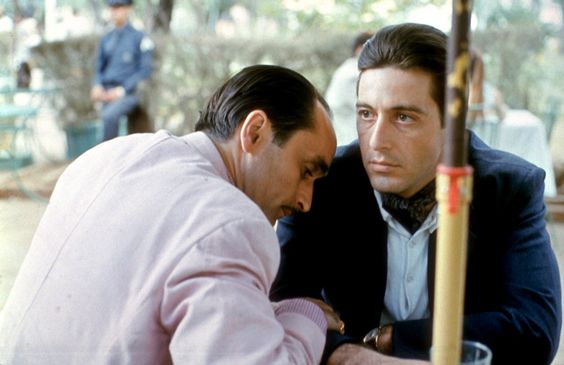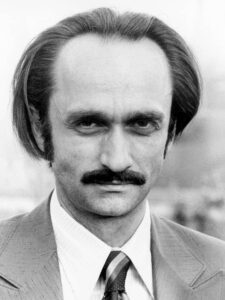
The tragic romance that shaped Meryl Streep’s life

In 1978, a young Meryl Streep was on the verge of becoming the greatest actress of her generation. She was also about to lose the love of her life.
“She doesn’t talk about it much,” says Michael Schulman, who explores this time in his new biography “Her Again.” “But that year was so wildly eventful and dramatic in her life. It was instrumental in shaping who she was as a person and an actor.”
Streep was 29 years old, a gosling in the New York theater world. She was living in a loft on Franklin Street with her boyfriend, actor John Cazale. He was 14 years her senior and a legend among his peers.
“I learned more about acting from John than anybody,” Al Pacino has said. “All I wanted to do was work with John for the rest of my life. He was my acting partner.”
Streep and Cazale met in 1976, when they were cast opposite each other in “Measure for Measure” in Central Park. By then, Cazale was not quite a star — he lacked that ephemeral quality — but he was regarded, in the industry, as a rare talent, in demand among the great directors of the era.
He was Fredo in “The Godfather” and “The Godfather Part II,” and had lead roles in “The Conversation” and “Dog Day Afternoon.” Of the five movies he starred in, all would be nominated for Best Picture, and three would win.
“One of the things I loved about the casting of John Cazale,” said “Dog Day” director Sidney Lumet, “was that he had a tremendous sadness about him. I don’t know where it came from; I don’t believe in invading the privacy of the actors I work with or getting into their heads. But my God, it’s there — every shot of him.”
“Time moved differently for John Cazale,” Schulman writes. “Everything went slower. He wasn’t dim, not by a long shot. But he was meticulous, sometimes maddeningly so.”
He was known among directors as “20 Questions,” because he wanted detailed back story on all his characters. Pacino said a simple dinner with Cazale would become epic: “I mean, you’d be done — washed, finished and in bed — before he got halfway through his meal. Then the cigar would come out. He’d look at it, light it, taste it. Then finally smoke it.”
And then there were his unusual looks, so perfect for the misfits of ’70s cinema: attenuated frame, high forehead, prominent nose. Sad, black eyes.
Streep fell for him instantly. He was equally knocked out.
“Once he was in that play,” actor Marvin Starkman said, “the only thing he talked about was her.”
In looks and manner, Cazale was completely foreign to the young Streep.
“He wasn’t like anybody I’d ever met,” she said later. “It was the specificity of him, and his sort of humanity and his curiosity about people, his compassion.”
Of the two, Cazale was the famous one, but they were still starving artists. Cazale would take Streep to dinner in Little Italy, where restaurant owners, awed to have Fredo in the room, insisted they eat for free.
“They were great to look at, because they were kind of funny-looking, both of them,” said the playwright Israel Horovitz. “They were lovely in their way, but it was a really quirky couple. They were head-turners, but not because, ‘Wow, is she a beauty!’ ”
As Schulman writes, “the romance moved as fast as John moved slow,” and they were soon living happily together in Cazale’s Tribeca loft.
They were the envy of the New York theater world — she the most naturally gifted actress in generations, he the most naturally gifted actor, legendary director Joe Papp their patron — until one day in May 1977.
Cazale, who was in previews for “Agamemnon” uptown, had been feeling ill enough to miss performances. Papp was concerned enough to get Cazale an emergency appointment with his own doctor on the Upper East Side.
Within days, Streep and Cazale were sitting in the doctor’s office with Joe and Gail Papp. The diagnosis: Cazale had terminal lung cancer. It had spread throughout his body.
They sat there, Gail Papp said, feeling “like you’ve been struck dead on the spot.”
“John fell silent,” Schulman writes. “For a moment, so did Meryl. But she was never one to give up, and certainly not one to succumb to despair . . . She looked up and said, ‘So, where should we go to dinner?’ ”
Cazale dropped out of his play immediately. Streep was starring in the musical “Happy End,” and her castmates saw no sign of her anxiety or grief. Cazale would show up at the theater now and then, still smoking his cigars. Streep didn’t nag or criticize — she simply made her own dressing room off-limits to smokers. Her grace outstripped her age.
“She had a kind of tough love about it,” actor Christopher Lloyd said. “She didn’t let him malinger.”
Streep and Cazale tried to keep the severity of his condition between them. Even Cazale’s brother, Stephen, didn’t realize how bad it was until one day, after the three of them had lunch in Chinatown, Cazale stopped on the sidewalk and spat up blood.
